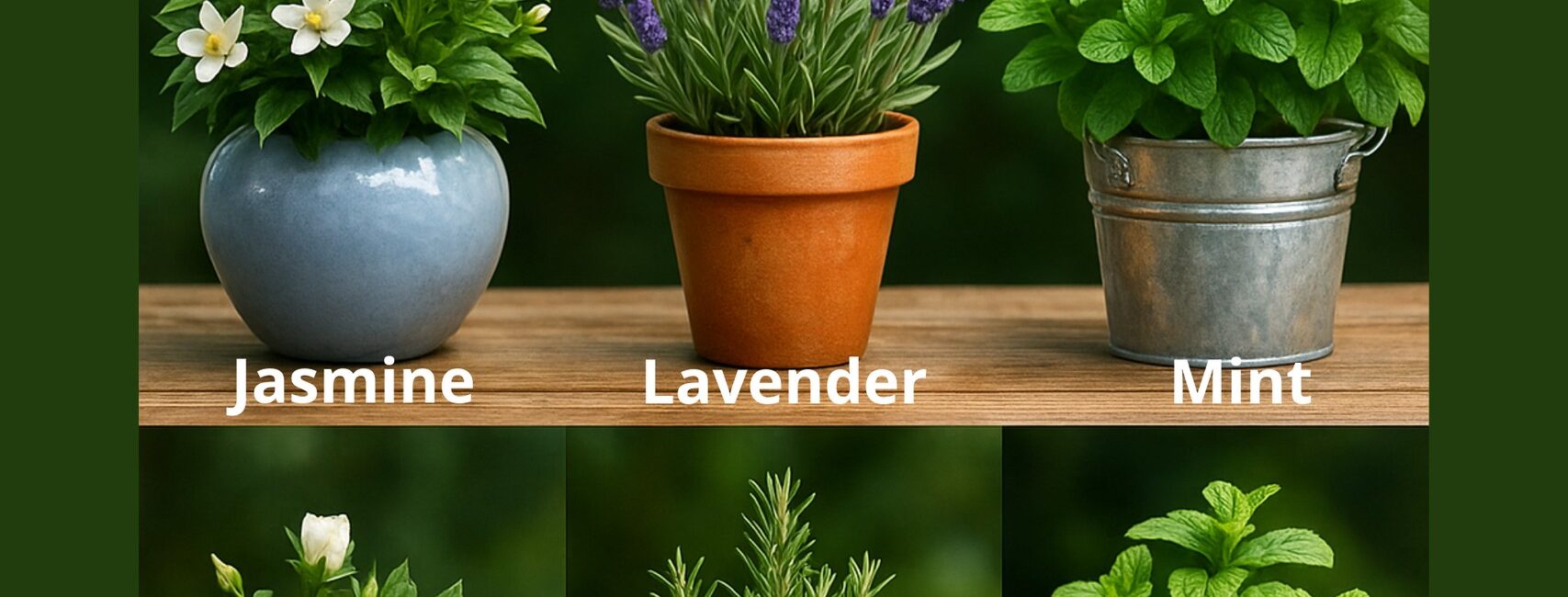💧 Gardenia Care Guide
- Light: Bright, indirect sunlight; avoid harsh direct rays.
- Water: Keep soil evenly moist; do not let it dry out.
- Humidity: Requires high humidity—place on a pebble tray or use a humidifier.
- Soil: Acidic, well-drained soil rich in organic matter.
- Fertilizer: Use an acid-loving plant fertilizer every 2 weeks in spring/summer.
- Pruning: Remove spent blooms and prune lightly after flowering.
🌿 5. Rosemary (Rosmarinus officinalis)
Smells like: Woody, piney, earthy
Best placement: Kitchens, study areas, dining rooms
Scent benefits: Improves memory, focus, and respiratory function
🌸 About Rosemary
Rosemary is an aromatic evergreen shrub with needle-like leaves and a distinctly pine-like scent. Native to the Mediterranean, it has been used for centuries in cooking, medicine, and even spiritual rituals.
Inhalation of rosemary’s scent has been associated with enhanced memory and cognitive performance—making it an excellent plant for workspaces.
🌿 Uses Around the Home
- Ideal for kitchen counters or herb gardens.
- Place in a home office or study area to enhance concentration.
- Use sprigs in soups, roasts, or infused oils.
💧 Rosemary Care Guide
- Light: Requires 6–8 hours of direct sunlight.
- Water: Allow the top 1–2 inches of soil to dry between waterings.
- Humidity: Tolerates lower humidity levels well.
- Soil: Well-drained, sandy soil with neutral to alkaline pH.
- Fertilizer: Monthly feeding with a balanced fertilizer.
- Pruning: Regular pruning encourages bushiness and prevents legginess.
🍋 6. Lemon Balm (Melissa officinalis)
Smells like: Citrusy, light, lemony sweet
Best placement: Bedrooms, sunrooms, near entrances
Scent benefits: Reduces stress, deters insects, uplifts spirits
🌸 About Lemon Balm
Lemon balm is a member of the mint family, but it carries a delightfully citrusy aroma. Its bright green, slightly crinkled leaves release their scent with the slightest touch, making it a joyful and functional plant to keep indoors.
In herbal medicine, lemon balm is used to treat anxiety, digestive issues, and insomnia. It’s also a natural insect repellent, making it doubly useful indoors.
🌿 Uses Around the Home
- Place in bedrooms to encourage calm and sleep.
- Use on windowsills to deter bugs.
- Add fresh leaves to herbal teas, cocktails, or bathwater.
💧 Lemon Balm Care Guide
- Light: Bright, indirect light or partial sun.
- Water: Keep soil lightly moist, not soggy.
- Humidity: Tolerates average indoor humidity.
- Soil: Light, well-draining potting
mix.
- Fertilizer: Feed monthly with a balanced, water-soluble fertilizer.
- Pruning: Regularly pinch back to prevent flowering and encourage foliage growth.
🌟 Quick & Essential Care Tips for All Fragrant Houseplants
Growing fragrant plants indoors isn’t difficult once you know the basic needs common to most aromatic houseplants:
💡 Light
- Most scented plants prefer bright, indirect sunlight.
- South or east-facing windows are ideal.
- Rotate pots weekly for even growth.
💧 Water
- Water moderately; too much water can cause root rot.
- Let the topsoil dry out between watering unless the plant prefers consistently moist soil (like gardenia or mint).
- Use pots with drainage holes to prevent waterlogging.
🌱 Soil
- Use well-drained potting mixes suitable for herbs or flowering plants.
- Enrich soil with organic compost or peat moss as needed.
🌬️ Humidity & Air Circulation
- Most plants benefit from good air circulation and moderate humidity.
- Use a humidifier or misting for tropical or Mediterranean varieties.
- Avoid placing plants near heating vents or cold drafts.
🌸 Fertilizer
- Use a balanced, water-soluble fertilizer during the active growing season (spring and summer).
- Avoid over-fertilizing as it can lead to salt buildup and damage roots.
🌼 Final Thoughts: Create a Symphony of Scent and Beauty
Incorporating fragrant houseplants into your living space is more than a decor decision—it’s a holistic lifestyle choice. These plants delight the senses, elevate mental wellness, and create a more welcoming and emotionally nurturing environment.
Whether you want to infuse your bedroom with the dreamy aroma of jasmine, revitalize your kitchen with minty freshness, or bring a spa-like atmosphere to your home with lavender, these fragrant plants serve multiple roles: natural perfumers, healers, and décor elements.
Start with one or two and see how they transform your space—not just visually, but emotionally and physically. Before you know it, you might just have your own indoor botanical sanctuary, alive with beauty and brimming with the healing power of nature.




